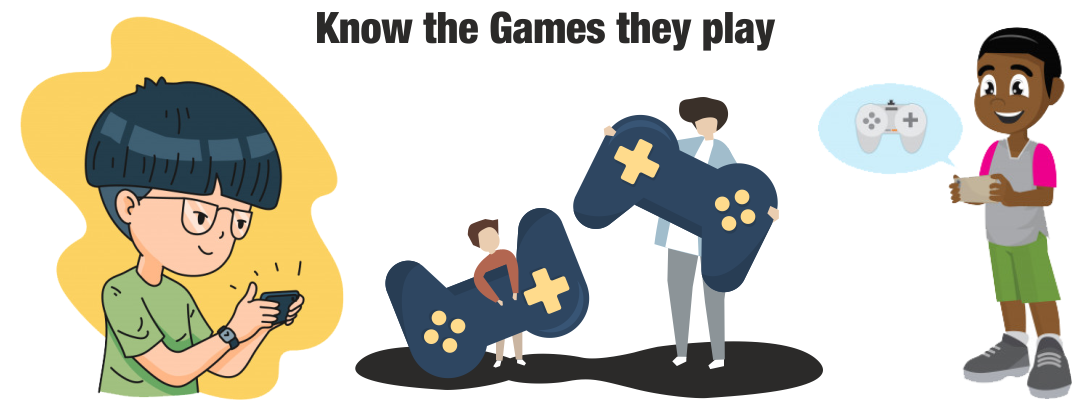
Online Gaming Safety - A Guide for Parents


India’s online gaming market is serious business; with estimates over 10,000 Crores it has an ever increasing popularity. With our kids getting used to smartphones at an early age, online gaming becomes an important part of Digital Parenting.
While games can improve your child’s coordination, problem-solving and multi-tasking skills, they also have negative effects.
While games can improve your child’s coordination, problem-solving and multi-tasking skills, they also have negative effects.
This toolkit for Parents looks into:
How Much Time Should They Be Spending Gaming?

There is no magic number; it all depends upon the effects gaming is having on other aspects of your child's development. Just like a traditional Indian thali, Gaming is an important part of growing up in 2019, but it needs to be balanced with other aspects.
Keep a lookout for:
- Spending more time alone, less interaction with friends outdoor activities
- Lacking interest in school, grades falling
- General lethargy, trouble sleeping, headaches or eye strain
- Change in meals, unexplainable hunger, diet
- Reduced personal hygiene
- Extreme interest in particular websites or games
- Aggression when asked to decrease playtime or agitation when away from the device
What Are In Game Purchases, And How to Put a Cap on It?

Some games already have inbuilt requirement of payments. These could be to buy a special game artifact, or gain access to advanced levels, it could be anything from a wheel for a sports car, or a special gun in a shooter game.
Have a chat about costs
- Share with them how this imaginary world is costing real money, its a complex discussion, usually helps with pocket money theme.
- Need to set limits, as the games are designed to achieve maximum profit per user.
- Ensure you have understood and set the parental controls on mobile devices and gaming consoles. To ensure that your child does not indulge in over spending it is essential to limit in-game and in-app purchases.
- It a good practice to keep passwords for the App Store or Google Play to yourself so your child cannot purchase apps and add-ons also advisable to set up ‘family sharing’ so any purchases must be approved by you.
What Sort of an Experience Are They Having While Gaming?

Many online games have an inbuilt chat feature, which opens up the experience to meet new people, at times it's also a space where your child can come in contact with other adults.
With these games, your child could be communicating with strangers, including adults, through webcam, private messaging or online chat, increasing the risk of contact from online abusers, or bullying from other players.
Explain digital privacy to your child
- Explain why they should not share personal information like their full name, birth-date, address, phone number, school name or identifiable photos.
- Suggest use of cartoons, or another image or an avatar with a screen name that is different to their real name. Be creative
- Explain how adults at times groom children through private chats during games, the more conversational you make it, the easier it is to be informed.
- It's essential to know who your child is interacting with online, who their friends are and what do they chat about. In case some stranger is asking about their personal information, the contact needs to be blocked and reported to the platform.
- If you happen to find out about the details of a user indulging in grooming please inform the police, as usually such perpetrators are repeat offenders. Details of India’s Cyber Crime Cell.
- Encourage them to share the experience, make sure they know you are on their side and they are being very brave by sharing information with you.
- Ensure you keep a record of all the messages, via screenshots/pictures.
- Please help them block, mute or ‘unfriend’ that person from their players list, or turn off the in-game chat function.
- Report the behavior to the Game administrator; if you need further assistance please contact us.
How To Ensure Gaming Does Not Lead To Gambling?

Many games have a gambling theme which means they have gambling-like elements. That may make gambling more familiar and ‘normal’ for young people.
We highly recommend keeping these games away from children.
- Games like poker, slots, blackjack or roulette do not offer the opportunity for your child to bet, win or lose real money, but they include actions similar to real gambling and often look and sound the same.
- Some games incorporate ‘loot’ boxes (‘bundles’, ‘crates’ and ‘cases’) containing items like in-game currency, equipment, tools, weapons or ‘skins’. Players can earn or purchase access to a loot box without knowing the value of what is inside, like a lucky dip. There is concern that this feature can make it seem normal to pay for something whose value depends on chance, and may potentially lead to gambling.
- ‘Skins’ — used in some games to alter the appearance of a player’s weapon, equipment or avatar — can vary in value depending on how rare and popular they are. Although they cannot be exchanged for real money within the game, they may be used to gamble and be converted to cash on third party websites.
- It's a difficult, but an essential one. Help your child understand that some features in online games are used to encourage more play and spending. Talk to them about gambling, what it is and its consequences both online and in the physical world.
- Ensure that any in-game and in-app purchases are first discussed, the more involved you are in the games they are playing the easier it will be to intervene.
- They have many questions about gambling
- Obsession with gambling like apps and games
- Obsessing about odds when watching sport instead of focusing on the game
- Borrowing money from family and friends
- Being secretive about their activities
- Having mood swings or appearing stressed
- Suffering forms of depression, including isolation from friends
- Skipping school or not doing as well as usual
Is Your Child In A Safe Gaming Environment?

- Ensure that the computer or games console is in an open area of your home; or if your child is playing on their smartphone /handheld device, get them to do it in the family room.
- Ensure you have a virus scan installed and updated on all devices to protect against viruses, malware and other online threats.
- Search for in-game parental controls and safety features; it's also essential to check the Age limit set on a game. These controls can help restrict access to certain content and limit spending on in-game and in-app purchases. In case they are missing, probably the game is for adults and your child should not be playing it.

- It is important to protect your privacy online, help your child to create a screen name that does not reveal their real name.
- It is important to have conversations about phishing and viruses with children. You need to simply tell them that viruses can be easily avoided by not clicking on the links provided by strangers, usually under the name of "cheat codes" programs to help with game play.
- Work together on how much time should be spent gaming, remember these games are designed to keep the user indulged for a long duration, hence it's essential to build steps towards the game time coming to an end.

- It's very important to have conversations regarding the games they like and who they are playing with. You need to create a safe space before they will share their views, only then can you explain the risks.
- Best way to understand the risks involved in a particular game is to play it with the child. As games develop there are new features added, plus it’s only when they realize your interest in the game will they share their experiences and queries.
- Change in behavior is one of the flags for abuse, be it grooming or bullying, many children try to internalize the abuse it's essential keep a look out for any such changes. Do they want to spend a lot more time alone? Is there this new mysterious friend they have made? Are they trying to hide their devices? These are some extremely important signs one should not ignore.
- Sharing vulnerabilities is only possible if they feel safe to talk, it takes time, have patience, don't judge them, let them complete their thoughts. As simple as this sound this step is not easy to execute.

- Games vary from one another! They can be violent or have sexual/adult content, and may contain themes, language and images that are unsuitable for your child.
- Age restrictions of a game needs to be checked individually. Easiest way to do that is to Google the game go through a couple of reviews, see what other parents are saying about it.
- How game rating is done can also be found at Pan European Game Information (PEGI) and the US Entertainment Software Rating Board (ESRB).

- Let them decide, be a good guide but let them take the decisions; it will be a good way to start training them in one of the most important life skills.
- Always good to approach it in a project form, where one sets out with a plan. As parenting is so multi-dimensional we sometimes get carried away in trying to cover too many topics. Stick to the plan.
This is a constantly updated list of contact information for social media apps, gaming networks, and related companies – so you know where to get help for bullying, harassment, threats, and other forms of misuse. Visit this Link.
